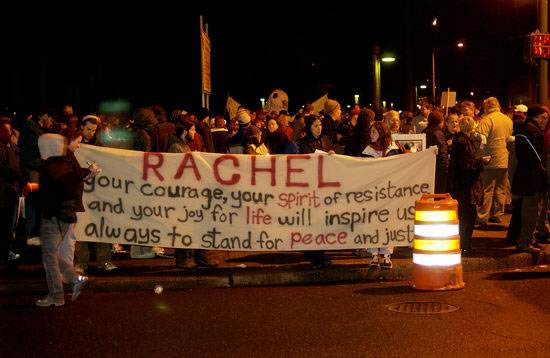By guest author Dr. Dahlia Wasfi
On August 27, 2012, the US Marine Corps announced “non-judicial administrative punishments” for several Marines who were videotaped urinating on three dead bodies in Afghanistan.

Such minor punishments can include “a reprimand, reductions in rank, forfeiting pay, extra duties or being restricted to a military base.” These Marines will not face criminal charges for their deviant behavior which could be considered a war crime.
While the dead victims have often been identified in the media as Taliban fighters, I have not seen any evidence for this allegation or any justification for their deaths.
On August 28, 2012, the travesty of justice continued with an Israeli court’s ruling in the civil lawsuit brought by the family of American activist Rachel Corrie.
Rachel was a member of the International Solidarity Movement in the city of Rafah in the Israeli-occupied Palestinian territory of Gaza. With her colleagues on March 16, 2003, she was practicing civil disobedience to prevent the demolition of Palestinian homes.
Rachel was crushed to death by two Israeli soldiers commandeering a 60-ton, D9 militarized Caterpillar bulldozer.
This week, the Corrie family’s case charging that the Israeli military was responsible for Rachel’s death was dismissed. As reported by The Guardian, the verdict stated that Israel “could not be held responsible because its army was engaged in a combat operation.”
This ruling blatantly contradicts international humanitarian law that was created to protect civilians during armed conflict.
Rachel’s mother, Cindy Corrie, pursues justice for her daughter and for all human rights defenders and those suffering under oppression. The night before the verdict, she said: “Craig [Rachel’s father] and I have been so blessed because Rachel gave us this opportunity to focus here. There’s no end to the work that can be done around this issue, and other peace and justice issues.…”
Since justice is lacking from the institutions created to serve it, we must continue our work on whatever issues are dearest to our hearts.
As long as we are without justice, we will be without peace.
For more information on Rachel and the Corries’ work, please visit:
- Rachel Corrie Foundation
- The Carter Center’s call for accountability after the Corrie verdict
Dahlia Wasfi

